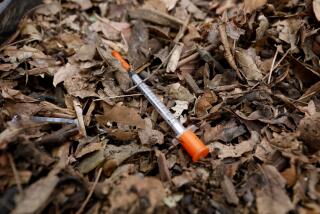Morality Issues Said to Impede AIDS Fight
- Share via
WASHINGTON — Clean-needle exchanges, safe-sex education and drug abuse treatment are powerful weapons against the AIDS epidemic, but their effectiveness is being blocked by moral and government objections, a panel of experts concluded Thursday.
The committee selected by the National Institutes of Health cited strong scientific evidence that members said proves the effectiveness of behavior-modification programs in slowing the AIDS epidemic.
The 12-member panel urged leaders at all government levels to change policies that prevent use of what they called “lifesaving public health strategies.”
“The AIDS epidemic is a current and pressing public health emergency” that can be lessened by behavior-modification programs, said Dr. David Reiss of George Washington University Medical Center, chairman of the study committee.
“I completely reject this,” said Robert L. Maginnis, senior policy analyst for the Family Research Council. He said evidence of how well needle exchanges and safe-sex programs work remains inconclusive and often involves “faulty science.”
In its report, the NIH committee found that clean-needle exchange programs in New Haven, Conn., and in Amsterdam did not lead to increased drug use, encourage young people to start using drugs or cause more needles to be discarded in public places.
Such programs did reduce--by 80%--the amount of needle sharing among drug users, the committee found, leading to an estimated 30% reduction in new HIV infections.
A federal welfare law that permits only the teaching of abstinence in sex education also should be changed, said Reiss. “It is not consistent with the scientific findings” of effective teaching tools for young people on how to avoid an AIDS-virus infection, he said.
He said safe-sex education, which can include recommending using condoms and limiting partners, is the most effective way to reduce the sexual spread of AIDS. A program among inner-city women, the report said, led to doubled use of condoms.
The committee drew up the report after three days of evaluating scientific literature and hearing testimony from experts.
More to Read
Sign up for Essential California
The most important California stories and recommendations in your inbox every morning.
You may occasionally receive promotional content from the Los Angeles Times.












